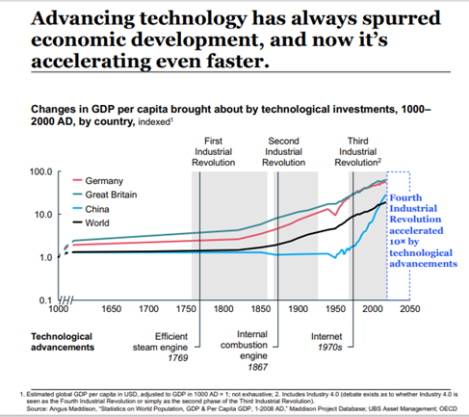Generative AI is an evolving field that has experienced significant growth and progress in 2023. By utilizing machine learning algorithms, it produces new content, including images, text, and audio, that resembles existing data. Generative AI has tremendous potential to...

Generative AI is an evolving field that has experienced significant growth and progress in 2023. By utilizing machine learning algorithms, it produces new content, including images, text, and audio, that resembles existing data. Generative AI has tremendous potential to revolutionize various industries, such as healthcare, manufacturing, media, and entertainment, by enabling the creation of innovative products, services, and experiences.
Notable advancements in generative AI have emerged in 2023, including the emergence of generative language models, increased adoption by different sectors, and the rapid growth of generative AI tools. These developments offer unprecedented opportunities for both businesses and individuals to leverage generative AI for innovation and growth.
A Closer Look at Breakthroughs in Generative AI
Taking a closer look at breakthroughs in generative AI, one significant development is the explosive growth of Gen AI tools. These tools, such as OpenAI's DALL-E, Google's Bard chatbot, and Microsoft's Azure OpenAI Service, empower users to generate content that resembles existing data. This availability of diverse Gen AI tools reveals new possibilities for innovation and growth.
Another breakthrough is the rise of generative language models powered by deep learning algorithms. Leading models like OpenAI's GPT-3, Google's T5, and Facebook's RoBERTa have played a crucial role in various applications, including chatbots, content creation, and language translation. These innovations have been, in fact, the foundation for the AI developments we witnessed recently.
OpenAI's GPT-4 stands as a state-of-the-art generative language model, boasting an impressive over 1.7 trillion parameters, making it one of the largest language models ever created. Its applications range from chatbots to content creation and language translation.
Facebook's RoBERTa, built on the BERT architecture, utilizes deep learning algorithms to generate text based on given prompts. Its applications span from chatbots to content creation and language translation.
Moreover, Google has introduced a groundbreaking generative language model called Gemini. Operating on Google's state-of-the-art TPUv5 chips, Gemini claims to have computing power five times greater than GPT-4. It was publicly released at the start of December 2023.
The Impact and Adoption Across Industries
In 2023, generative AI adoption surged across industries, notably in healthcare for drug discovery, disease diagnosis, and personalized medicine. The technology processes vast medical datasets, creating content such as images and records, enhancing healthcare quality and accessibility.
Philips employs generative AI to revolutionize healthcare, aiding patient engagement by simplifying complex medical information. Clinicians benefit from actionable insights derived from intricate data, facilitating informed decisions. The application extends to optimizing operations, forecasting patient volumes, and streamlining administration, showcasing Philips' commitment to innovative healthcare solutions and improved patient outcomes through advanced technologies.
Likewise, Paige utilizes generative AI for cancer diagnosis through its Paige Platform, leveraging extensive global datasets for the full digitization of pathology. Clinically validated, the AI applications show notable improvements, including a 70% reduction in cancer detection errors.
In manufacturing, 2023 witnessed profound breakthroughs in product design, optimization, and quality control. Generative AI revolutionized product design, reducing time and costs while enhancing efficiency and product quality. In optimization, it revamped manufacturing processes, creating workflows that reduce waste, boost productivity, and elevate final product quality. In quality control, it emerged as a game-changer, identifying defects through advanced inspection methods, enhancing accuracy, efficiency, and overall product quality while reducing time and costs.
LeewayHertz's ZBrain AI platform revolutionizes manufacturing workflows by optimizing supply chains, improving quality control, streamlining production, and automating supplier evaluations. Leveraging large language models, ZBrain transforms data into actionable insights, enhancing efficiency, reducing errors, and elevating overall product quality for greater operational agility, productivity, and efficiency in businesses.
The media and entertainment sectors benefitted from generative AI in 2023 for content creation, recommendation systems, and audience engagement. This trend is expected to persist as businesses recognize its potential for innovation and growth. Generative AI optimizes designs, reduces costs, and transforms personalized content, enhancing engagement and creating new revenue streams. Addressing risks and workforce changes tied to generative AI adoption is crucial despite the opportunities it presents.
For example, OpenAI's DALL-E has transformed media and entertainment by generating realistic images from text prompts. In addition, platforms like Netflix and TikTok employ machine learning algorithms to predict user preferences, enhancing content recommendations.
Anticipating Generative AI Trends for 2024
As we step into the year 2024, compelling trends in generative AI are set to reshape industries. Quantum AI, which combines quantum computing and machine learning, holds immense potential to revolutionize healthcare, finance, and transportation. A groundbreaking concept known as Web3, built on blockchain technology, offers new possibilities for decentralized content creation and distribution through generative AI applications.
The emergence of multimodal generative AI, which combines different types of data like text, images, and audio, is expected to give rise to more diversified innovative applications such as virtual assistants and chatbots. One particularly significant development is the introduction of emotion-infused virtual assistants capable of detecting and responding to human emotions. This advancement has the potential to greatly enhance customer service quality and create new revenue streams.
Another important trend is prompt engineering, which focuses on creating high-quality prompts for generative AI models. This trend plays a pivotal role in improving the accuracy and efficiency of these models. Collectively, these trends promise a transformative landscape, impacting various industries from virtual assistance to decentralized content creation and beyond.
Challenges for Generative AI
While generative AI holds immense promise, it also presents challenges and risks that require careful consideration. Ethical concerns, data-related issues, security risks, regulatory compliance, and technical challenges are among the key obstacles.
Maintaining a balance between innovation and ethical considerations is crucial to ensure the responsible use of generative AI. The effectiveness of generative AI heavily relies on large volumes of data, which may contain biases or be incomplete, leading to potential inaccuracies or unreliable outcomes. Maintaining the right balance between the quantity and quality of data becomes essential in handling this challenge.
In addition, overcoming security risks is pertinent to avoid the generation of malicious content or unauthorized access and theft of sensitive data. Effectively managing these risks is vital for creating a secure environment for the deployment of generative AI.
Moreover, regulatory compliance adds another layer of complexity, as generative AI falls under the purview of various regulations and laws, including those related to data privacy and intellectual property. Ensuring adherence to these legal frameworks becomes imperative for responsible and lawful use.
On a technical front, generative AI may face challenges in producing content that is of high quality and relevance. Addressing these challenges will be crucial for the continued advancement and success of generative AI.
The Bottom Line
In conclusion, it is evident that generative AI has the potential to bring about significant transformation, but it also poses ethical, data-related, security, regulatory, and technical challenges. Maintaining a balance between innovation and responsibility is crucial.
By addressing these challenges through comprehensive risk management, we can ensure the ethical, secure, and compliant use of generative AI, thereby promoting its positive impact across various industries. As we navigate the complex domain of generative AI, a thoughtful and holistic approach will be key to realizing its full potential.
The post Generative Everything: An Exploration of Breakthroughs in 2023, Impacts, and Future Insights Across Industries with AI appeared first on Unite.AI.
















